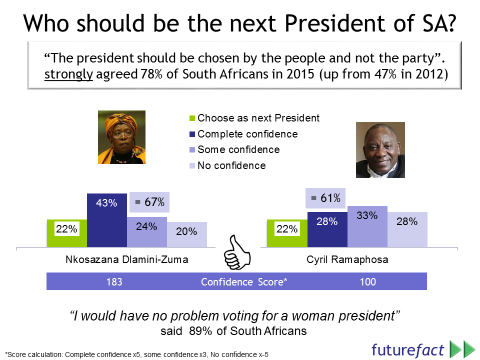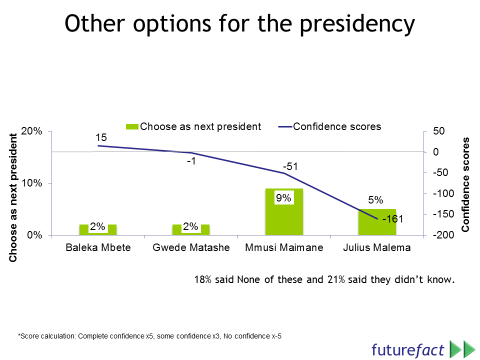futurefact finds – Presidential Contenders
The government has confirmed that Nkosazana Dlamini-Zuma’s will stand down as African Union chairperson in July. She along with Cyril Ramaphosa and Baleka Mbete (and possibly Gwede Mantashe) have been mooted as the main candidates to take over from President Zuma when he moves on.
Over recent years confidence in President Zuma has plummeted from a score of 248 in 2009 to -46 by the end of 2015 (see futurefact finds). In keeping with the Constitutional Court (ConCourt) ruling, futurefact found that 80% of South Africans agreed that President Zuma should pay back the money for Nkandla and, unlike President Zuma, the ConCourt has the confidence of the public (75% of South Africans and a confidence score of 208).
However, neither the President nor the ANC appear to be listening to the wishes of South Africans. futurefact finds that almost 9 out of 10 believe the government shows little concern for what its citizens think of it and 8 out of 10 that it has ‘forgotten about people like me’.
So when President Zuma’s term is over (for whatever reason) who would South Africans like to see as the next president and which candidate enjoys their confidence?
futurefact finds that when respondents were presented with a list of possible candidates for the next President of South Africa, Ramaphosa and Dlamini-Zuma tied for the top position. But, when levels of confidence in these two leaders are taken into consideration, Dlamini-Zuma came out well ahead of her rival. Furthermore 89% of South Africans (87% of males and 91% of females) said they would have no problem voting for a woman president.

Other ANC candidates included Gwede Mantashe and Baleka Mbete but neither inspired South Africans with much confidence and neither emerged as viable choices for a future president. Included on the list were Mmusi Maimane and Julius Malema as they are leaders of the two larger political parties and the results clearly indicate that most South Africans would be unlikely to choose either of them and, particularly in the case of Julius Malema, have very little confidence in them. But low as their levels are, they are both higher than the selection of Mantashe or Mbete as possible future presidents of the country.
Additionally, their profiles may have risen subsequent to the survey fieldwork period as a result of the ConCourt judgement that the President and the National Assembly had both been found wanting in terms of their conduct according to the Constitution – a motion brought by the EFF and supported by the DA among others. A significant proportion (almost 40%) of South Africans either didn’t know which candidate they preferred or said that they didn’t want any of those on offer though there is almost unanimity among citizens that they would prefer to choose the President directly rather than have the party do so, an indictment of the ANC’s choice.

Interesting times in South Africa … but then, when are they ever not?
futurefact has been surveying the attitudes and beliefs of South Africans since 1998. The findings presented above are from futurefact 2015/16 which is based on a probability sample of 3,015 adults aged 18 years and over, living in communities of more than 500 people throughout South Africa - representing 22,8 million adults living in 9.4 million households. If you would like to find out more about futurefact and its extensive attitudinal databases please contact Jos Kuper 082 904 9939 or check out www.futurefact.co.za

